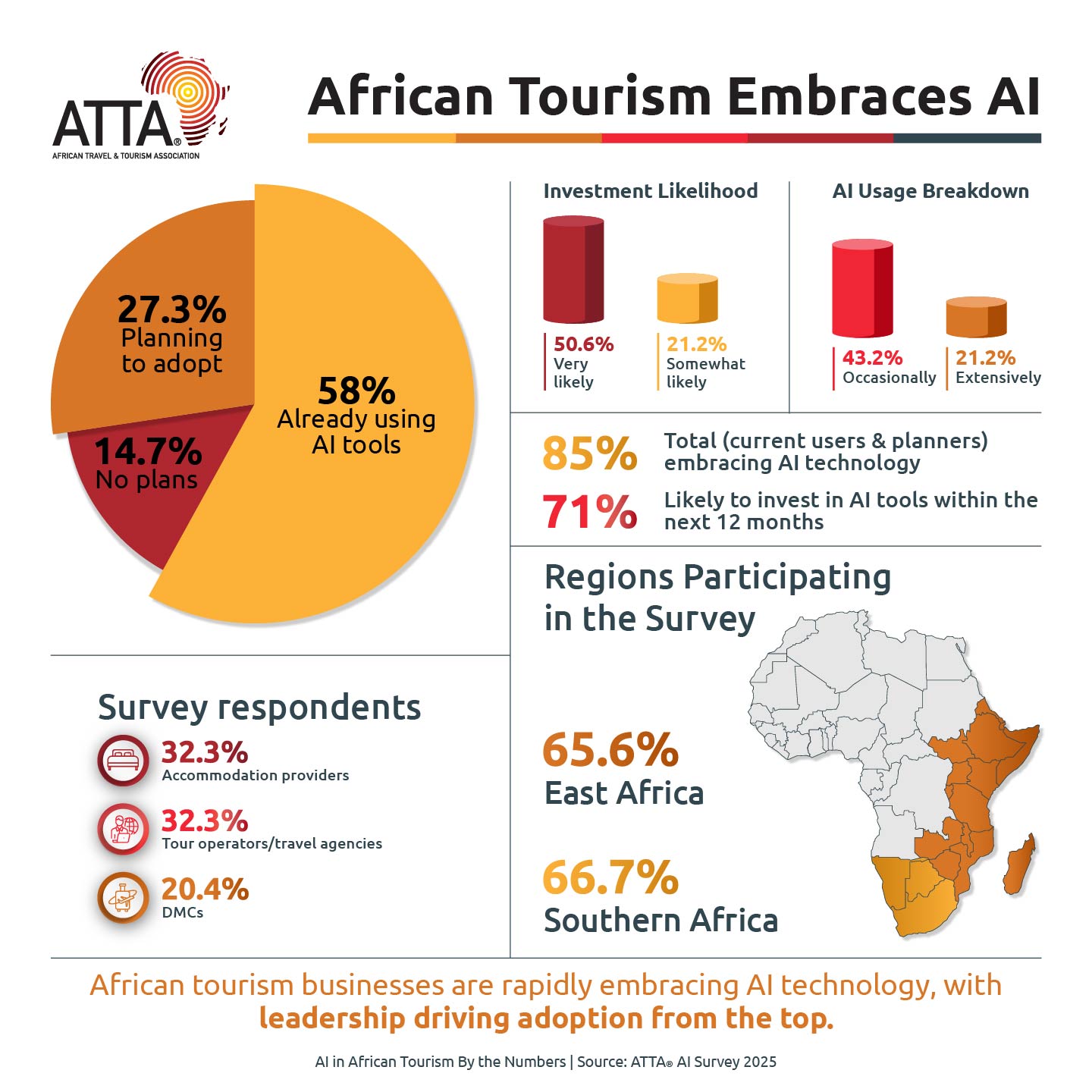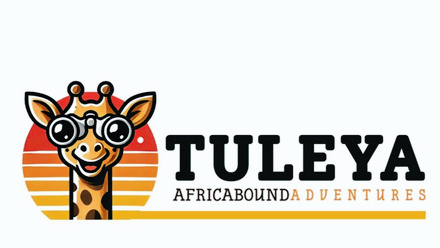Why African Tourism Ceos Are Taking The Reins On AI Transformation

A recent survey by ATTA® has uncovered a striking trend: AI adoption in African tourism isn't being driven by IT departments—it's coming directly from the C-suite.
The ATTA® survey provides compelling evidence that African tourism leaders see AI as a strategic imperative rather than a technical add-on:
- 85% of African tourism businesses are either already using AI tools (58%) or planning to adopt them soon (27%)
- 71.8% are likely to invest in AI tools or training within the next 12 months
- 73 out of 100 is how executives rate AI's significance to African tourism over the next 3-5 years
Why leadership-driven AI matters
Global research from Accenture suggests that successful AI adoption isn't just about having fancy algorithms—it's equally about having leaders who champion the technology and build a culture that embraces it.
This is where African tourism is getting it right: when owners and directors lead the charge on AI, their enthusiasm ripples throughout the entire organisation.
This top-down approach is especially powerful for the smaller businesses that dominate African tourism (most survey respondents had fewer than 50 employees). When leadership is on board, resources suddenly become available for training, team members get permission to experiment, and hands-on learning becomes a priority—exactly matching what the survey found tourism professionals want: practical webinars (81.2%) and real-world applications rather than theoretical concepts.
Why the C-Suite is driving AI adoption
1. Strategic vision: When leaders support AI, they link it directly to business strategy: from frictionless customer journeys to predictive maintenance.
2. Cultural transformation: CEOs shape a culture of innovation more effectively than any other role. Accenture’s research highlights that “AI Achievers” thrive due to top-down cultural endorsement. Leaders who foster an innovation-friendly environment—where experimentation with AI is encouraged—see faster success.
3. Budget & Resources: ATTA®’s own findings confirm that even small businesses are finding the time and treasury for AI—suggesting leadership is re-prioritising budgets to capture AI’s potential benefits.
While global research shows a concerning disconnect between CEO ambition and organisational readiness—with only 29% of broader executive teams believing they have sufficient in-house expertise—African tourism leaders appear unusually aligned in their AI vision:
- 50.6% are "very likely" to invest in AI tools or training within the next 12 months
- Only 14.8% have no immediate plans for AI adoption
- Marketing leaders (23.7%) form the second-largest respondent group, showing strong alignment between C-suite vision and departmental execution
This top-down strategic approach positions African tourism businesses to potentially leapfrog the "capability gap" that hampers AI adoption in other markets, where CEOs are often pushing aggressive AI agendas ahead of their organisations' technical comfort zone.
Navigating the "Triple Threat"
Despite their enthusiasm, African tourism executives face what might be called the "Triple Threat" slowing AI adoption:
- Talent: 81.2% cite lack of technical expertise as their primary challenge
- Time: 44.7% point to lack of time or resources to learn new tools, a particular challenge for smaller organisations with limited staff
- Treasury: While only 27.1% cite cost as a barrier (surprisingly low given the predominance of small businesses), budget considerations remain important
These interconnected challenges create what Accenture identifies as a gap between "leadership ambition and organisational readiness"—a phenomenon occurring globally.
A critical insight to mitigate these threats to AI adoption is the importance of culture change alongside technical implementation. As Accenture notes, travel executives must foster "an innovation-friendly environment where experimentation with AI is encouraged and failures are seen as learning opportunities."
Leaders in travel and tourism will need to create an organisational culture where AI is seen as a collaborative tool rather than a threat.
The path ahead
Drawing from both global best practices and local realities, the companies poised for success will likely be those where leaders:
- Foster innovation culture – Creating what Accenture terms "an innovation-friendly environment" where experimentation with AI is encouraged and failures become learning opportunities
- Build AI literacy across roles – Developing basic AI understanding at both strategic and tactical levels, addressing the educational gap that spans multiple roles
- Invest in practical Gen AI training – Focusing on specific tourism applications rather than theoretical knowledge
- Address ethical considerations early – Implementing what the WTTC calls "responsible AI frameworks" with transparency, accountability, and human oversight, particularly important in a relationship-based industry like tourism
- Travel is people-centric: Guests still crave personal service. AI should be seen as a staff-support tool rather than a human replacement. CEOs who implement AI with empathy can enhance personalisation without sacrificing customer warmth.
Lastly, the smartest companies won't just adopt AI to make existing processes faster. They'll use AI to question fundamental assumptions about their business: Does this process need to exist at all? Could this customer interaction be reimagined completely?
The true AI revolution in African tourism won't come from automating tedious tasks, but from rethinking entire business models and customer experiences from the ground up.
If you found this interesting, click here for more ATTA® resources on Generative AI in Travel. Note this if for members only.


